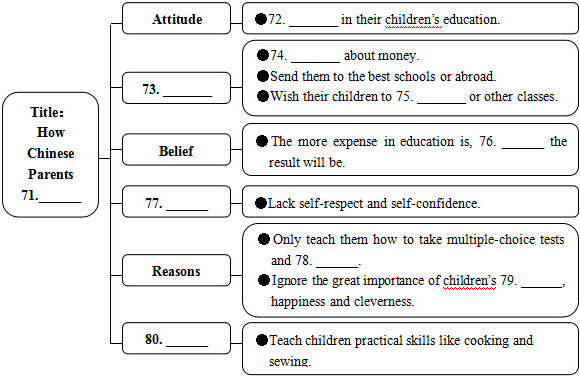题目内容
13.In the past few decades,the popular belief in the area of organizational behaviour and organizational psychology has been that happy workers are better workers.However,new research at the University of Alberta shows that sad workers are more productive.Psychologist Dr.Robert Sinclair and his former PhD student Carrie Lavis recently conducted a series of four studies addressing the effects of experimentally induced (诱发的) happiness versus sadness on work productivity by asking the participants to build circuit boards (电路板).In the first study,sad people committed significantly fewer errors than did happy people (approximately half the number of errors) but there was no difference in the number of boards completed.Thus,sad people were more productive.
In similar studies Sinclair and Lavis found the same results along with evidence that happy people might not devote as much energy to the task in order to maintain their happy moods-they considered that task as something that might detract (减去) from their present feelings.Conversely,sad people appeared to be devoting energy to the task in order to divert themselves from their sad feelings."It is important to know that the moods were unrelated to the task,"said Sinclair."Unhappiness is coming from something else."
These findings are not surprising,said Sinclair,since there has been a growing body of literature in the area of social psychology demonstrating that sad moods lead to more calm lengthy intent consideration and,often,more thoughtful or accurate judgments.
In Sinclair's following studies,when people believed that the task would make them feel good,they devoted more energy to the job.The bottom line,said Sinclair,is that it is important for organizations to take into account the emotions of their employees.It seems it could be beneficial to creating situations that lead people to believe that performing their jobs will cause them to feel good:this could cause increases in motivation and superior performance.
72.The new research done at the University of Alberta showsC.
A.sadness leads to accurate judgments
B.sad workers are less engaged in their work
C.sad workers produce better
D.happiness can make people do well
73.The purpose of the series of four studies conducted by Dr.Sinclair wasA.
A.to find out the influence of happiness vs.sadness on work
B.to ask the subjects to build circuit boards
C.to prove that happy workers are better workers
D.to explore the ways how to produce happiness or sadness at work
74.According to the third paragraph,the happy workers might not devote as much energy
to the task becauseD.
A.they hate doing the same job for a long time
B.they never feel sad
C.happiness diverts them from their task
D.they want to keep their happy moods
75.It is suggested in the last paragraph thatB.
A.increases in motivation and superior performance are important
B.companies should take into consideration employees'emotions
C.companies should create situations that make workers feel good
D.employees should do the task that would make them feel good.
分析 本文是一篇科教类阅读,文章主要介绍了一项研究:悲伤的工人更有效率.辛克莱博士及他的学生一块做了四项研究,主要是找出快乐和悲伤的情绪分别对工作效率的影响.此外,辛克莱博士还说:企业应该考虑员工的情绪.
解答 CADB
72.C细节理解题.根据第一段new research at the University of Alberta shows that sad workers are more productive.可知艾伯塔大学的新研究表明,悲伤的工人更有效率.故选C.
73.A理解判断题.根据第二段Psychologist Dr.Robert Sinclair and his former PhD student Carrie Lavis recently conducted a series of four studies addressing the effects of experimentally induced (诱发的) happiness versus sadness on work productivity by asking the participants to build circuit boards (电路板).可知辛克莱博士进行的四项研究的目的是找出快乐和悲伤的情绪分别对工作效率的影响.故选A.
74.D理解判断题.根据第三段happy people might not devote as much energy to the task in order to maintain their happy moods.可知快乐的人不可能在任务上花很多的能量,是为了保持愉快心情.故选D.
75.B细节理解题.根据最后一段The bottom line,said Sinclair,is that it is important for organizations to take into account the emotions of their employees.可知辛克莱说:对组织来说,最重要的是要考虑到员工的情绪.由此可知,企业应该考虑员工的情绪.故选B.
点评 本文考察学生的理解推断能力以及细心程度,只要抓住文章的关键词,采用寻读的方法查找细节,就能找到正确答案.

 举一反三同步巧讲精练系列答案
举一反三同步巧讲精练系列答案 口算与应用题卡系列答案
口算与应用题卡系列答案